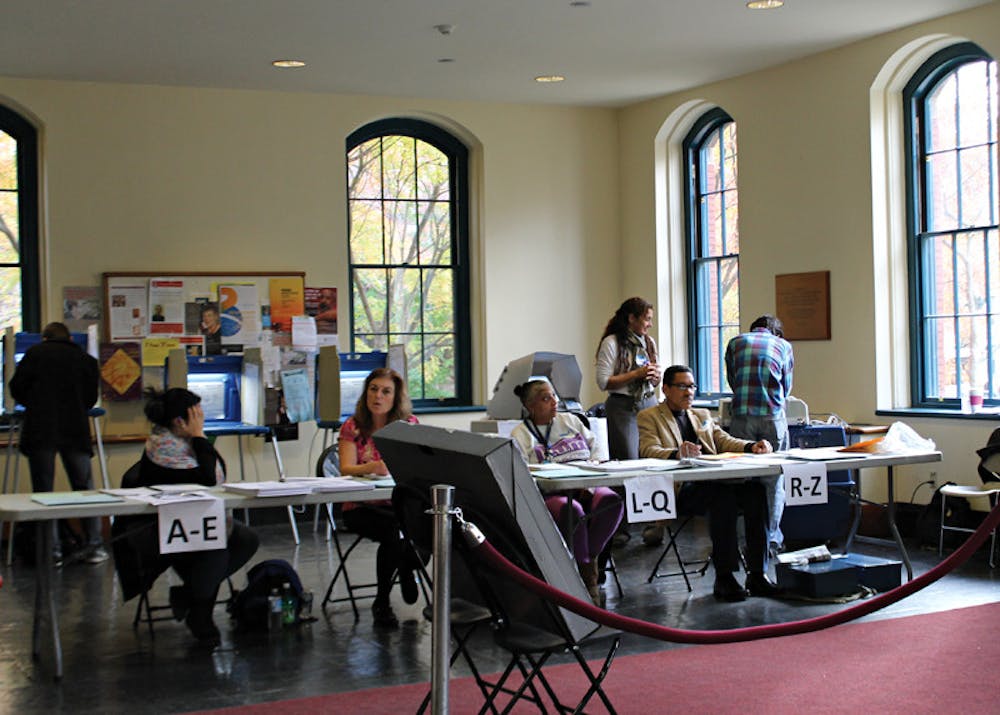Newport voters once again rejected the addition of table games to the Newport Grand casino by voting 57 percent to 43 percent to reject Question 1 on the ballot Tuesday, though statewide voters approved the measure by nearly the same margin.
The measure could only pass if it was supported by a majority of voters statewide and in Newport. If Question 1 had passed, former Providence mayor and real estate developer Joseph Paolino Jr. P’06 P’17 had planned to invest $40 million into the casino.
Nearly 57 percent of overall Rhode Island voters approved the addition, with over 43 percent voting against it.
Advocates had argued that the move would increase state revenue and create 200 new jobs as well as stabilize current jobs vulnerable due to declining gambling revenues.
But the group Citizens Concerned About Casino Gambling posited that the $40 million could be better spent elsewhere and not in a “declining” industry.
“I think it’s a resounding victory of the local community and business owners over big money and political interests,” said Elizabeth Taver, CCACG campaign coordinator, on Tuesday night.
“I’m disappointed that the 175 families that depend on the income they receive from there could be jeopardized and they could be out of a job in the future,” Paolino said. Newport voters “were sold a package that said (table games) would destroy Newport. I still don’t think it would, but I respect the political process. In two or four years, we’ll look at it again.”
Adding table games to Newport Grand was on statewide and Newport ballots in 2012 and faced much the same fate, passing statewide but being rejected by Newport voters by about 600 votes, the Providence Journal reported. That year, some Newport residents cited concerns about the casino’s movement to any site other than its current location near Pell Bridge in rejecting the measure. Question 2 — a constitutional amendment to prohibit gambling location changes — was added to this year’s ballot to address those issues.
Question 2 was approved by a measure of 67 percent to 33 percent. Paolino said CCACG and Paolino Properties lawyers cooperated on advocating for the passage of the question.
But Taver said an unclear, last-minute change to the wording of the measure fundamentally changed its impact to “strip the power of local referendum ballot voting.”
Elsewhere on the ballot, Rhode Island voters rejected Question 3, voting against holding a state constitutional convention by a margin of 55 percent to 45 percent. The proposition is required by state law to be on the ballot once every 10 years but has not passed since 1984.
“When it goes through the regular checks and balances of the General Assembly, I believe (the people) have a fairer shot,” said Jennifer Norris, campaign manager for Citizens for Responsible Government, which opposed the measure. “It slows the process down, but I think, in some cases, that’s for good. It’s our constitution and it shouldn’t be something that’s rushed.”
Rhode Islanders approved four ballot questions allowing the state to issue bonds to pay for a variety of funding priorities.
Question 4, which would approve $125 million worth of bonds for a new College of Engineering building at the University of Rhode Island, passed 63percent to 37percent. Opponents to the question, as well as questions 5, 6 and 7, argued that the measures would cost the state too much money.
By a margin of 60.5 percent to 39.5 percent, voters approved Question 5, a $35 million bond to fund artistic, historic and cultural centers statewide. The money would go to nine different arts organizations, including WaterFire — which would use it to develop its headquarters into a more permanent space with a visitors’ center — and the Rhode Island School of Design Museum.
“The money will be dispersed across the state for a lot of very worthy projects, from Westerly to Woonsocket to Providence,” said Laurie White, the Greater Providence Chamber of Commerce president, on Tuesday night. “It will keep the fires burning at WaterFire and the lights on at Trinity” Repertory Company.
Question 6, to issue $35 million in bonds to fund improved mass transit hub infrastructure, was also approved by voters by a margin of 60 percent to 40percent. The funds would address Kennedy Plaza congestion and go toward renovations at the downtown Amtrak station.
Rhode Islanders also voted 71 percent to 29 percent to issue $53 million in bonds for environmental and recreational purposes, with the money going to the Roger Williams Park Zoo and the Clean Water Finance Agency, among others.
“Those funds will go a long way,” said William Sequino, executive director of the CWFA, which will receive $20 million.
“We’re able to turn it over to much more than $20 million” through a direct loan program that turns every dollar into four over time, he added. Many new projects, listed in a queue of projects costing $1.8 billion by the Department of Environmental Management, are awaiting funding, including Warwick sewer expansions and an upgrade to wastewater treatment in Warren.

ADVERTISEMENT




